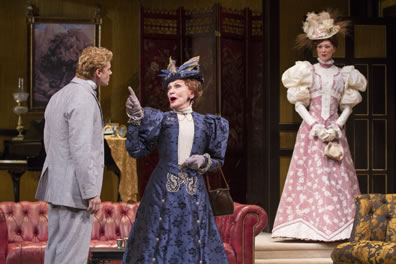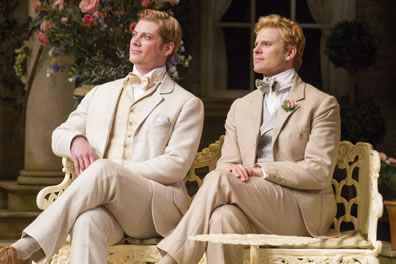The Importance of Being Earnest
Keeping Clear of the Wilde Side of Life
By Oscar Wilde
Shakespeare Theatre Company, Lansburgh Theatre, Washington, D.C.
Monday, January 27, 2014, J–5&7 (left side stalls)
Directed by Keith Baxter

Algernon (Anthony Roach) gets a lecture from his Aunt Augusta, aka Lady Bracknell (Siân Phillips) as her daughter, Gwendolen (Vanessa Morosco) watches in the Shakespeare Theatre Company's production of Oscar Wilde's The Importance of Being Earnest. Photo by Scott Suchman, Shakespeare Theatre Company.
There's a lot of yearning attached to this production of Oscar Wilde's classic comedy of manners, The Importance of Being Earnest. Most notable is that of Vanessa Morosco's depiction of Gwendolen Fairfax, and the way she speaks the name "Ernest" with such passionate yearning she seems willing to let Jack—whom she thinks is named Ernest—rip open her high-collared bodice right there and then even with her indomitable mother, Lady Bracknell, in the next room. This is Wilde at his wildest, true human emotions buttoned up by social decorum and channeled into absurdist dialogue.
Another yearning is less tangible but no less palpable: that of a director (Keith Baxter), a theater company, and an audience with nostalgic longing for good old days theater. From the opening curtain music cues to the elaborately detailed realistic sets to the cast's stage business, I felt I was being transported into one of those 1930s movies about putting on a Broadway show. This was the most old-fashioned rendering of Wilde's six-score-old but thoroughly modern play I've ever seen.
And it left a yearning in me. Wilde wrote The Importance of Being Earnest in 1895, brilliantly poking fun at the stratified British society of that era. In the five productions I've now seen, the play has been set in that timeframe. But why not do it in modern dress? You don't need to imagine what Wilde would have written about a society that orbits the likes of Kim Kardashian and Duck Dynasty; it's right there in Cecily reading from her diary about her long engagement with Ernest, complete with a brief falling out and forgiveness, though she's only just met the man who she thinks is named Ernest but is really Algernon. Hear such lines as Miss Prism saying, "I am not in favor of this modern mania for turning bad people into good people at a moment's notice," or Lady Bracknell saying, "I was not aware that Mr. Bunbury was interested in social legislation; if so, he is well punished for his morbidity," and you realize that instead of being transported to 1895 or even 1935, you are sitting right here in 2014. Cecily could be wearing The Row by Ashley and Mary-Kate Olsen, Gwendolen would be in Vera Wang, the self-centered Algernon donning Billy Reid, and the pseudo-serious Jack dressed in Tom Ford.
Baxter's nostalgic leaning makes for good entertainment for much of the audience present at this opening night—and I must point out that Sarah and I, in our mid-50s, brought the audience's median age down significantly—but it wasn't necessarily earnest theater. The shiny gold-embroidered curtain raises on Simon Higlett's set of Algernon's deliciously appointed apartment, and when for the second scene that shiny gold-embroidered curtain raises on a British estate garden festooned with rose bushes, the audience applauds. The set's beauty and detail is certainly worthy of applause, if not an Oscar for art design, as it so perfectly replicates such real settings you can find in Charleston, or the Hamptons, or Beverly Hills, or the estates along the Potomac owned by some of the people sitting in the theater seats applauding. However, the garden set overwhelms the actors, who appear as little playing pieces in a giant dollhouse.
And this for a play featuring outsized characters (fully realized in the gorgeous costume designs by Robert Perdziola). Out of his genius, Wilde has collected what can be best described as singular archetypes. As I've contended in my other essays about The Importance of Being Earnest on Shakespeareances.com, the comedy is richest when the actors hew to his or her character's belief that every single word is spoken as absolute truth, whether they are debating about marriage or muffins. For the most part, this cast acts as if it were in a classic Hollywood comedy engaged in silly banter with ridiculous antics—Oscar Wilde channeling Noel Coward (and STC will be finishing out its current season with Coward's Private Lives). Floyd King takes a vaudevillian comic's approach to the part of Dr. Chasuble, turning to the audience with a joke-is-coming delivery that lacks only the drum punctuation. And without that ba-da-boom, Wilde's otherwise keen satire on the clergy falls flat. Chasuble going on about his sermon for all occasions is, for me, one of the funniest passages of a play with countless comic moments because my minister father recycled a couple of his favorite sermons. I think Chasuble here should be speaking of this sermon as if it really were so good it fit the occasions of christenings, festal days, and funerals alike, not as an actor telling a joke.
Screen and stage legend Siân Phillips plays Lady Bracknell as a mighty fortress of social propriety. But unlike any Lady Bracknell I've previously seen, this one is very much the cynic. Her barbs are not simple statements of superior knowledge but digs at those she considers beneath her. Perhaps that is a true reading, for Jack does speak disparagingly of her as a Gorgon, though he doesn't really know what a Gorgon is like, but "In any case, she is a monster, without being a myth." Wilde also has a stage direction calling for Lady Bracknell to "sweep out in majestic indignation." Still, let's parse a single line reading. The background is that Jack, when he was a baby, was left in a handbag in the cloakroom of Victoria Station and found by a wealthy landowner who adopted him and then made him the ward of his granddaughter, Cecily Cardew. Upon meeting Cecily, Lady Bracknell asks, "Mr. Worthing, is Miss Cardew at all connected with any of the larger railway stations in London?" Phillips delivers this as a cynical barb; other Lady Bracknells deliver it as a justifiably appropriate query. The question here is not which is funnier—the line itself kills—but which makes Lady Bracknell truly indomitable.
Anthony Roach is an Algernon who delights in his wit, but he seems naturally flummoxed when he learns that he has long been engaged to Cicely in her mind, taking in the absurdity in wonder; the playwright, though, gives no indication that Algernon considers any of this absurd. (STC seems to have pegged Roach as the 1890s silly lover boy, as he played Frank Gardner in Bernard Shaw's Mrs. Warren's Profession and Bertram in a Shavian-style All's Well That Ends Well.) Gregory Wooddell is given to physical fits of frustration as Jack, and it's funny in a sitcom kind of way, but it's not good manners. Their betrotheds, on the other hand, play to Wilde's subtleties. Katie Fabel's Cecily is as earnest as Snooki nattering in her absurdist logic, and her blatant stupidity comes off as profundity. Occasionally, Fabel teeters on the edge of the airhead cliff, but she holds her own in her ultramannered, verbally contested chickfight with Gwendolen.
Morosco is all earnest—and all Ernest's—in her insightfully detailed portrayal of Gwendolen. "You don't think there is any chance of Gwendolen becoming like her mother in about 150 years, do you, Algy?" Jack asks his friend. "All women become like their mothers. That is their tragedy," Algernon replies. If there is a foundation for Morosco's portrayal of Gwendolen, it is in that repartee between the two men, though she's not waiting 150 years to be like her mother. Her peremptory attitude, her statue-like bearing, and her dignity and indignity she got from Lady Bracknell. "On this point, as indeed on all points, I am firm," Lady Bracknell says to Jack. Similarly, "I am never wrong," Gwendolen tells Jack, and "My first impressions of people are never wrong," she tells Cecily, twice, though her first first impression is to like Cecily very much, and her second first impression is to despise her. When Lady Bracknell is coaching Cecily on good posture, telling her that "Style largely depends on the way the chin is worn," look across the stage at Morosco's Gwendolen, chin held at the exact high position Cecily is trying to attain, and we realize she has been chin-high the whole play.

The two men who would be Ernest—Jack Worthing (Gregory Wooddell, left), and Algernon (Anthony Roach)—in the Shakespeare Theatre Company production of Oscar Wilde's The Importance of Being Earnest. Photo by Scott Suchma, Shakespeare Theatre Company.
Even when she is in the throes of ecstasy over the mere name of Ernest she keeps her chin up. "It is a divine name. It has a music of its own. It produces vibrations," she says, and she believes it perfectly suits the man who is really named Jack, though she doesn't know that's his name. If she did, she'd have no interest in him. "There is very little music in the name Jack, if any at all, indeed," she says. "It does not thrill. It produces absolutely no vibrations." In fact, when she says "Jack," Morosco treats the word as a something you'd drop in a trash can. "The only really safe name," she says, "is [catch your breath here] Ernest."
Morosco achieves her laughs in the space between what she is and what Wilde has her say. Two other cast members who achieve that distinction are Todd Scofield as Lane, Algernon's butler, and Patricia Conolly, who lifts Miss Prism from plot-pertinent bit player to comic centerpiece. Conolly has found the joke in Wilde's naming the character, a most prim and proper schoolteacher with a passionate complexity she simply can't contain. When Chasuble says, "Were I fortunate enough to be Miss Prism's pupil, I would hang upon her lips," Conolly's Prism swoons. Wilde's stage direction is to have her glare here, but the swooning garners the bigger laugh.
I guess it comes down to the merits of stage business comedy versus verbal wit. As Conolly shows, you can have both if you fully embrace the character's embrace of his or her own self. Sacrificing the playwright's intention comes at a price. Wilde's intent was to mock the social mores of his age, and it's perfectly suitable to continue playing it that way. But I'm not so sure he wasn't mocking the social mores of our age, too. Playing it as silly comedy in a style of someone else's yesterday is playing it safe, but I'd prefer to play it on the Wilde side.
Eric Minton
January 24, 2014
Comment: e-mail editorial@shakespeareances.com
Start a discussion in the Bardroom



 Find additional Shakespeareances
Find additional Shakespeareances